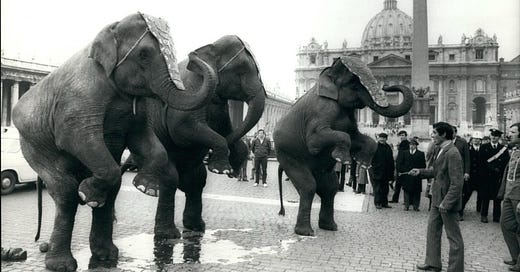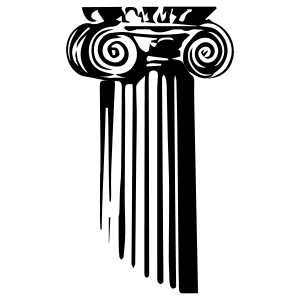
Happy Friday friends,
We’ve had a big week of news here at The Pillar. We tend to bang on about our commitment to “long-form” and “deep-dive,” and hopefully the last few days give a taste of what we mean by that.
Quick Links
Our week kicked off with a series we have been working on for some time, examining what the pandemic has done to parish collection plates across the country. The results were very interesting, and in many places counterintuitive. We published parts one and two on Monday and Tuesday.
Part three of our series went up Wednesday, a feature look at who gave more during the last year, and who stopped giving, and why.
Part four, a wrap-up piece from data analyst Brendan Hodge, was published Thursday. We’re in talks with Brendan now about our next data deep dive, so stay tuned.
We had a two-part interview with Cardinal Napier of South Africa this week, which is something I’ve been looking forward to doing for a while.
I’ve interviewed more than a few bishops and cardinals, but few - if any - can compare with the sweep and clarity of vision with which Napier covered it all.
Personnel remains the Holy See’s biggest annual expense, and, after a year in which Vatican City was effectively closed for business, this decision to cut pay could be a sign of just how bad things are. Of course, things might not be nearly so grim were it not for the Vatican Secretariat of State’s special genius for making literally hundreds of millions of euros disappear into thin air or down the plumbing.
—
The UK judge was scathing in his assessment of (lack of) evidence presented by prosecutors, and equally withering about wider circumstances of the case. The decision also laid bare, for the first time, Torzi’s version of the events that led to him being charged with fraud, embezzlement, extortion, and money laundering.
You’re a reasonable person
We have been covering the details of the Vatican financial scandal since the day we opened The Pillar. I have been writing about it for as long as I have been in Catholic journalism.
We’ve run a series of explainers to try to get you up to speed if you're new to the most involved soap opera in the Church, and this week’s story has a lot of technical details all of its own.
I don’t expect you to read it all now, and, frankly, I don’t blame you for not following along all that closely — I’m probably more obsessed with the minutiae of this deal than near anyone who isn’t making millions off it, and it gets a bit much for me sometimes.
But I want you to follow it as closely as you can.
And I would like you to try not to get bone-throwing mad about the whole thing, because while the story is complicated and increasingly lurid, we should avoid giving into hyperbole. We should try to keep cool heads. We should, out of love for the Church and hope in Pope Francis’ stated reforming efforts, try to be reasonable about this.
But here are some things that aren’t complicated:
The Secretariat of State borrowed 200 hundred million euros from two Swiss banks, one of them later shut down for serial money laundering violations, and gave it all to a single guy, Raffaele Mincione, to whom they had just been officially introduced, to invest for them.
Does that sound reasonable to you?
After a few years, they decided the cleanest way to get their investment of 200 million (borrowed) euros out was to forfeit it all in exchange for ownership of a London building in which they already owned a 45% stake. The building came with a 150 million euro mortgage attached, so they took that too.
Does that sound reasonable to you?
Cardinal Parolin later leaned on the IOR, a (not “the”) Vatican bank, to refinance the 150 million euro mortgage, writing to the bank’s president and basically telling him to get with the program. The bank complained to the Vatican cops, triggering an investigation that’s still going on.
Parolin later told reporters that the details of the London deal were still “opaque” to him, but he was working to clear it up. Reasonable?
How about this:
Gianluigi Torzi has a long track record of financial scandal, including allegations of fraud and money laundering involving Catholic hospitals, financial deals with links to organized crime, and some other pretty colorful stuff. You can find it in about 30 seconds on Google. But the Secretariat of State hired him as its broker and basically handed him the keys to the now 350 million euro deal which, they now claim, he screwed them on.
Or this:
While the Vatican has charged Torzi with shaking down Vatican investment managers for millions, the UK court heard evidence from a Vatican prosecutor that pretty much everyone involved in the financial affairs of the Secretariat of State, up to and including the sostituto Archbishop Edgar Peña Parra and Cardinal Parolin, knew what he was doing and signed off on it step-by-step.
Here’s another figure in the affair:
Fabrizio Tirabassi is a layman who worked for years at the Secretariat of State administering its financial affairs. According to what Torzi told the UK court, “Tirabassi openly admitted blackmailing several prelates of the church, including Cardinal Angelo Beccui, who had been Substitute before Archbishop Peña Parra.” Torzi also says Tirabassi offered him a prostitute to celebrate a good day’s business, and later threatened his life and family over the London property deal.
Depending on who you ask in the Vatican, Tirabassi is either suspended, or has been given early retirement by the Secretariat of State. He has not, by all accounts, been either fired or brought in for questioning by Vatican prosecutors.
Believe me, I could go on. But you get my point: Does any of this sound reasonable to you?
It’s not funny
Of course, almost nothing about the situation is reasonable, and the more details emerge, the stranger it gets.
What started off as the Vatican’s own version of the “Big Short” has decidedly veered into “Godfather Part III” territory at times, but now seems to be fast approaching farce.
There is something Python-esque about the image of the Secretariat of State’s top investment managers gathering in luxury hotels, bragging about blackmailing cardinals, shaking each other down, threatening each other’s families, and ordering out for hookers.
And, to be clear, that’s exactly what the players in this deal appear to be accusing each other of.
To be clear, there are no obvious good guys here, and there is no reason to take Torzi’s word over anyone else’s. But there are some points in Torzi’s account that raise a lot of unanswered questions. That’s the point.
For this affair to reach any kind of credible resolution, it has to end in open court, which many people, myself included, have been quietly expecting. But that may not happen.
At least judging from this week’s UK court ruling, the Vatican’s prosecution team is beginning to resemble the Pink Panther, mustering less evidence in court than is freely available in company filings - if you take the time to look for it.
Reading the UK judge’s decision, it is hard to escape his conclusion that prosecutors are either woefully out of their depth or have been deliberately selective with the evidence they present. There is the concern that they are trying - or have been told - to spare senior figures at the Secretariat of State from more scandal, sabotaging their own case in the process.
The entire two year investigation may yet collapse, leaving us with something, like the McCarrick report, which blames no one in particular but passively accepts that “mistakes were made.”
For the good of the Church, that must not happen.
Here’s why. And this is the critically important part:
If this scandal doesn’t end with a trial, European banking regulators, among others, will take a long, hard look at the unique status of the Church in international law. Good stewardship of that status requires a credible legal response to a scandal of this magnitude.
The McCarrick scandal posed an existential threat to the Church’s moral authority in the United States. The Vatican financial scandal could be much more dangerous: At stake is the moral probity of the curia, the financial viability of the Vatican, and the credibility of the Holy See as a sovereign member of the international community — and believe me, while the bulk of the Vatican press corps may not be following this story, the diplomatic corps certainly are.
This is not a subpar film about subprime mortgages, or a bad airport thriller, this is the Church tight-roping a test of moral credibility on the world stage. That’s neither drama nor comedy, it’s a tragedy.
See you next week, and always look on the bright side of life, I guess.
Ed. Condon
Editor









I, as many are, am sick of this news but am so thankful for those who pursue it because as long as it lays in the dark it will continue to fester. Thank you so much.
Incredibly helpful! Thank you for the hard work!